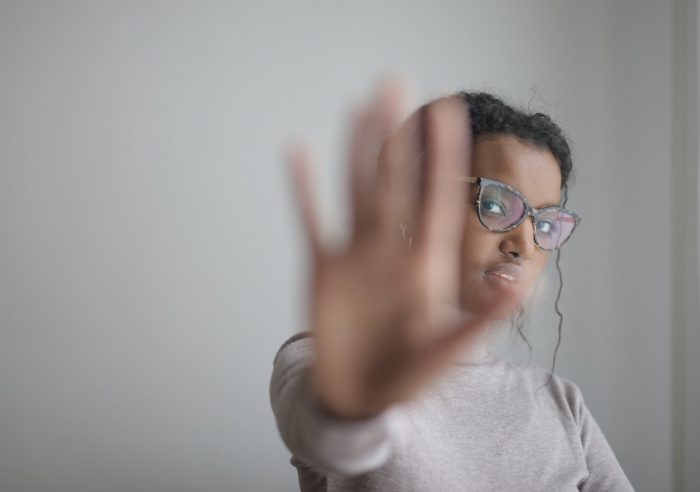“You have to know how to accept rejection and reject acceptance.” ~ Ray Bradbury
~
As humans we need acceptance, we crave validation, we desire acknowledgment, and feed on people’s affirmations.
I would like to say, I don’t—that people’s opinions bear no weight on my decisions and that what someone perceives of me as has no bearing on my emotional health.
And I would be lying.
As fundamental to us as is water and food to our physical welfare, the deep-set requirement to be accepted is one that is at the core of our emotional needs. So where does it stem from?
Some social scientists say it’s born from a historical survival mechanism. Hundreds of years ago, it was a power-in-numbers game. The bigger the pack, the better the odds. Agreeing and gaining acceptance gave us safe passage. Being part of the collective and being accepted literally became a matter of life or death.
The most natural and relatable source for most of us now, however, is our childhood. The need for validation is a learnt behaviour; as a child, approval is often met with reward. This then promotes a strong sense of well-being, a secure feeling—the feeling that you have made someone happy, which therefore equates to an early association with a form of love.
Acceptance is equal to love, right?
We get this from our parents, grandparents, teachers, aunts, uncles, etc. I see it in my behaviour toward my own children. This sense of approval and its association to love, security, and respect is then hard programmed into our psyche and dictates a lifetime of approval seeking with the driving force being to re-establish these feelings in all our relationships thereafter.
The opposite of acceptance is rejection. So, herein lies the problem.
Our hardwired association with acceptance then dictates our inability to deal with rejection. We see rejection as being disrespected, unloved, unsafe. Our physical reaction is often to lash out, self-exclude, and fall into a depression. Our mental health deteriorates, our physical health is compromised—even our immune systems can start to break down.
Rejection is a regular part of life. We all experience it. In romantic relationships, in family relationships, friendships, and in our working environments. There will always be rejections in our lives. For every validation we feel, there will also be occasions we are invalidated. This is life. We need to harden ourselves to its fate.
What I have learnt along my way is this, is as I started off saying: Not all acceptance is positive, and not every rejection is negative. A topsy-turvy way of looking at it, maybe, but one we should consider.
Whilst the natural association is to reverse that, it is not always the case. There is a fine line between needing acceptance and other people’s acceptance being needed. To live our lives constantly requiring this validation from others is as unhealthy as the sharp stab of rejection because it stunts our growth and blindsides our ability to make conscious and independent decisions.
It is a self-governing behaviour that we have carried from childhood, allowing its roots to then wind through us and plant these associations firmly in the ground.
We can sometimes care so much about how other people perceive a situation that we lose sight of how we feel. We lose sight of our own needs, our truths, our own acceptance.
Over the years, I have found myself caring more about how someone perceived my relationship than the relationship itself. People-pleasing had become prioritised. I have not taken chances I have wanted to for fear of not wanting to upset others, and ultimately lost out. As I get older, I am slowly learning that my own validation is central to anyone else’s opinion, and in that, I am finding new freedom.
The unwiring of years of programming that promises reward for restraint, praise for pleasing, and love in losing gracefully is something that needs to happen. Similarly, I have found some of my biggest rejections have led me to beautiful destinations, guided me to new people, helped me establish lifelong friendships, and created new paths upon which I have then been able to walk as a stronger, more self-assured, and genuinely better-prepared person.
So is that rejection or redirection?
There has been a realisation for me, personally, that the only person I need acceptance from, is myself.
There is nothing virtuous in hanging your life choices on the whimpering approval or disapproval of someone else. This is self-sabotage at its finest. Do you think on their deathbeds these people will mull over your life choices? Nah; they will only be considering their own. As should we.
I am not suggesting we go around willfully hurting others or adopting a selfish stance for the sake of it—that we all become self-obsessed, bloody-minded people, and that we lose all compassion or act with objectivity in this process. But I am saying that not being true to ourselves at the cost of someone else’s rejection or acceptance will ultimately come back to haunt us.
I am saying that regret is harder to live with than the temporary disdain of a friend or colleague, that not doing something or doing something at the cost of losing yourself in the process simply to please others is not going to end well.
You cannot control anyone else’s opinion, neither can you change it. Let them have it. Keep it, voice it, and then do what you want to do anyway.
Let us learn to agree to disagree instead of living by someone else’s values.
Let us agree that to disagree is not a negative.
Let us disagree that we must agree on anything to live a fuller life.
~









Read 5 comments and reply